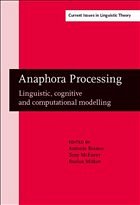Nicht lieferbar

Anaphora Processing
Linguistic, cognitive and computational modelling
Versandkostenfrei!
Nicht lieferbar
Main description:Anaphora processing is a central topic in the study of natural language and has long been the object of research in a wide range of disciplines. The correct interpretation of anaphora has also become increasingly important for real-world natural language processing applications, including machine translation, automatic abstracting, information extraction and question answering.This volume provides a unique overview of the processing of anaphora from a multi- and inter-disciplinary angle. It will be of interest and practical use to readers from fields as diverse as theoretical ...
Main description:
Anaphora processing is a central topic in the study of natural language and has long been the object of research in a wide range of disciplines. The correct interpretation of anaphora has also become increasingly important for real-world natural language processing applications, including machine translation, automatic abstracting, information extraction and question answering.
This volume provides a unique overview of the processing of anaphora from a multi- and inter-disciplinary angle. It will be of interest and practical use to readers from fields as diverse as theoretical linguistics, corpus linguistics, computational linguistics, computer science, natural language processing, artificial intelligence, human language technology, psycholinguistics, cognitive science and translation studies.
The readership includes but is not limited to university lecturers, researchers, postgraduate and senior undergraduate students.
Table of contents:
- Editors' Foreword
- I. Computational Treatment
- A Sequenced Model of Anaphora and Ellipsis Resolution
- How to Deal with Wicked Anaphora?
- A Machine Learning Approach to Preference Strategies for Anaphor Resolution
- Decomposing Discourse
- A Lightweight Approach to Coreference Resolution for Named Entities in Text
- A Unified Treatment of Spanish se
- II. Theretical, Psycholinguistic and Cognitive Issues
- Binding and Beyond
- Modelling Referential Choice in Discourse
- Degrees of Indirectness
- Pronominal Interpretation and the Syntax-Discourse Interface
- Top-down and Bottom-up Effects on the Interpretation of Weak Object Pronouns in Greek
- Different Forms Have Different Referential Properties
- Referential Accessibility and Anaphor Resolution
- III. Corpus-Based Studies
- The Predicate-Argument Structure of Discourse Connectives
- Combining Centering-Based Models of Salience and Information Structure for Resolving Intersentential Pronominal Anaphora
- Pronouns Without NP Antecedents
- Syntactic Form and Discourse Accessibility
- Coreference and Anaphoric Relations of Demonstrative Noun Phrases in Multilingual Corpus
- Anaphoric Demonstratives
- Focu, Activation, and This-Noun Phrases
Anaphora processing is a central topic in the study of natural language and has long been the object of research in a wide range of disciplines. The correct interpretation of anaphora has also become increasingly important for real-world natural language processing applications, including machine translation, automatic abstracting, information extraction and question answering.
This volume provides a unique overview of the processing of anaphora from a multi- and inter-disciplinary angle. It will be of interest and practical use to readers from fields as diverse as theoretical linguistics, corpus linguistics, computational linguistics, computer science, natural language processing, artificial intelligence, human language technology, psycholinguistics, cognitive science and translation studies.
The readership includes but is not limited to university lecturers, researchers, postgraduate and senior undergraduate students.
Table of contents:
- Editors' Foreword
- I. Computational Treatment
- A Sequenced Model of Anaphora and Ellipsis Resolution
- How to Deal with Wicked Anaphora?
- A Machine Learning Approach to Preference Strategies for Anaphor Resolution
- Decomposing Discourse
- A Lightweight Approach to Coreference Resolution for Named Entities in Text
- A Unified Treatment of Spanish se
- II. Theretical, Psycholinguistic and Cognitive Issues
- Binding and Beyond
- Modelling Referential Choice in Discourse
- Degrees of Indirectness
- Pronominal Interpretation and the Syntax-Discourse Interface
- Top-down and Bottom-up Effects on the Interpretation of Weak Object Pronouns in Greek
- Different Forms Have Different Referential Properties
- Referential Accessibility and Anaphor Resolution
- III. Corpus-Based Studies
- The Predicate-Argument Structure of Discourse Connectives
- Combining Centering-Based Models of Salience and Information Structure for Resolving Intersentential Pronominal Anaphora
- Pronouns Without NP Antecedents
- Syntactic Form and Discourse Accessibility
- Coreference and Anaphoric Relations of Demonstrative Noun Phrases in Multilingual Corpus
- Anaphoric Demonstratives
- Focu, Activation, and This-Noun Phrases




